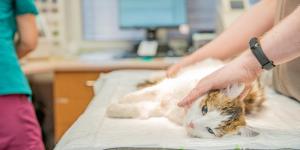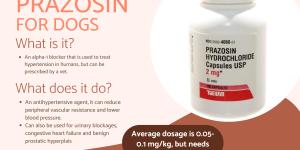Anesthesia for Dogs Side Effects



See files for Dogs
When we speak of side effects of anesthesia in dogs, we might think of worrying consequences which might occur due to reactions or complications. It is first important to note that certain side effects of anesthesia are completely normal and will not threaten the dog's health in the long term. For example, a dog may be disorientated, nauseous or have a decreased appetite while they recover from sedation, but these will alleviate on their own after a short time. Although they are safe procedures, spaying and castration in dogs require general anesthetic for the safety of the animal.
The main effect of general anesthesia for dogs is temporary unconsciousness. AnimalWised looks at the anesthesia for dogs side effects we need to look out for when a dog is recovering, whether this is from being neutered or any intervention which requires general anesthetic.
Why do dogs need general anesthesia?
Veterinarians recommend spaying and neutering for almost all dogs. These are procedures whereby permanent sterilization occurs, in the form of an ovariohysterectomy for females and orchiectomy (castration) in males. Although spaying is considered more invasive than castration, both require surgical intervention for the safety of the animal.
If a dog was conscious during the operation, the sensation of having their skin incised will be painful and they will have a negative reaction. This puts them and the veterinary staff in danger. To carry out the procedure safely and effectively, general anesthetic will be used.
The use of general anesthesia for dogs is not only limited to neutering surgeries. Other procedures such as tumor removal, emergency trauma treatment or even removal of foreign objects can also require general anesthesia. They are given this sedation for the same reason since the dog needs to be safe. It also allows the surgeon to carry out the procedure effectively without reactions from the animal.
Now we know why dogs need general anesthetic, we can look at some of the most important side effects:
Nausea and vomiting
Normal post-anesthesia recovery in dogs is the period which lasts around 24 to 36 hours after the surgical procedure. While the incision will need more time to heal, there may continue to be some sequelae during the 10 days after the surgical procedure.
Among the most common anesthesia for dogs side effects are nausea and vomiting. These are usually a result of the specific anesthetic drugs which are used. These drugs act on the gastrointestinal system of the animal, especially irritating the stomach. This can result in nausea, poor absorption in the colon and subsequent vomiting and/or diarrhea in the dog.
As a consequence of these clinical signs, the dog experiences temporary discomfort. It usually leads to a loss of appetite which returns once the anesthesia drugs are out of their system. They are only a problem if they persist longer than 24-48 hour after the surgery.
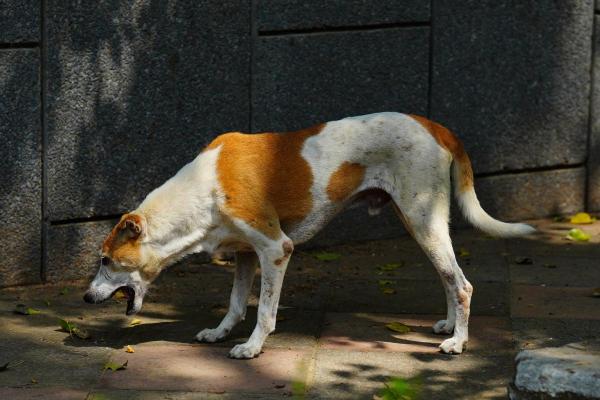
Respiratory problems
Some guardians may witness their dog is breathing strangely after surgery which requires anesthesia. This is something which is more common in certain dogs due to a previously susceptibility. They include:
- Brachycephalic dog breeds: such as the Pug or certain types of Bulldog. They are more susceptible to suffering from respiratory problems due to the particular anatomy of their airways, such as an elongated palate and compromised trachea.
- Older dogs: they may also be more susceptible to developing respiratory problems because they usually have compromised lung function that leads to a decrease in tissue oxygenation. It is recommended that a dog is neutered before they reach sexual maturity, so older dogs usually require surgical intervention for therapeutic reasons.
- Dogs with preexisting respiratory problems: this is why it is so important that a thorough pre-anesthetic examination is performed on dogs to evaluate the state of organs such as the heart, kidneys or liver and general health. This will be carried out by the specialist veterinary staff.
Among the respiratory problems that may occur, one of the most dangerous is aspiration pneumonia. This can occur due to the entry of regurgitated food during surgery or as a result of the effects of drugs used. This happens mostly in emergency surgical intervention since the dog should fast if the procedure has been scheduled beforehand. Any breathing difficulty after anesthesia needs to be reported to the veterinarian.
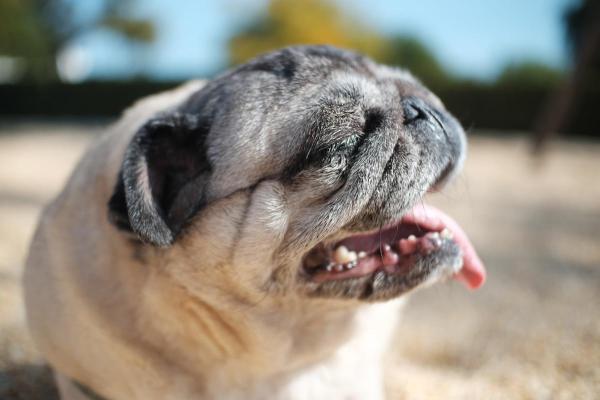
Disorientation
As a result of the drugs used to achieve general anesthesia, a common side effect when a dog regains consciousness is disorientation. The dog may appear dizzy or even have a lack of coordination when walking. They may walk into objects in the home or show and obvious lack of balance.
These general anesthesia side effects in dogs should be temporary. They are unlikely to last more than a few hours, but the dog can still be tired and sensitive up to 48 hours after the surgery. These side effects should cease once the anesthetic drugs have left their system.
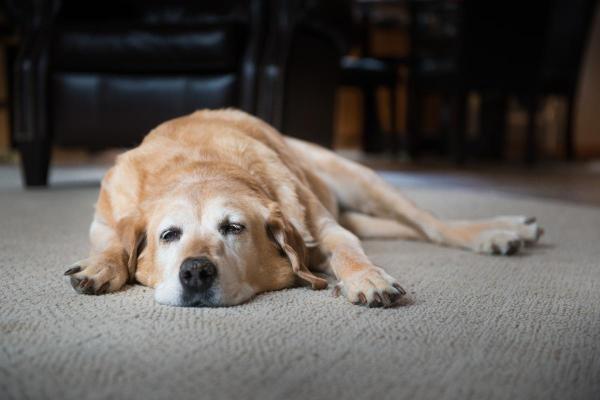
Shivers
Another side effect after anesthesia in dogs is shivering. It is common during and after the first moments after the operation. The dog feels chills after being anesthetized partly as a result of the low temperature of the operating room. It is also because the drugs that provide analgesia and anesthesia during the operation cause the normal body temperature of our dog companions to drop.
This feeling of cold is something normal and expected that occurs in most cases of surgery in dogs. It resolves on its own in the first hours after the surgical operation. It is also possible the dog may be shivering as a result of trauma experienced in the veterinary environment. If this persists, we need a welfare check and find ways to ease their anxiety.
Some dogs are more sensitive than others, meaning they can be more likely to have a negative reaction to a surgical intervention. Some of these are dogs which are also more likely to suffer separation anxiety or other generalized anxieties.
Drowsiness
As we have mentioned before, it is normal for dogs that have just come out of anesthesia to feel unstable and disoriented. It is also very common for them to feel sleepier than usual, appearing drowsy, less active than usual and taking longer naps.
This occurs as a consequence of the drugs that are used to achieve unconsciousness and sedation during surgery. Since these drugs affect the central nervous system, the dog's body requires a certain amount of time to completely eliminate them.
As we can see, the side effects of anesthetic in dogs are common and will resolve on their own after a short time. This does not mean there are not other aspects of surgical interventions which can result in problems. Learn more with our guide to complications after spaying or neutering a dog. If you observe any adverse reactions or worrying symptoms, speak to your veterinarian immediately.
This article is purely informative. AnimalWised does not have the authority to prescribe any veterinary treatment or create a diagnosis. We invite you to take your pet to the veterinarian if they are suffering from any condition or pain.
If you want to read similar articles to Anesthesia for Dogs Side Effects, we recommend you visit our Medicine category.



